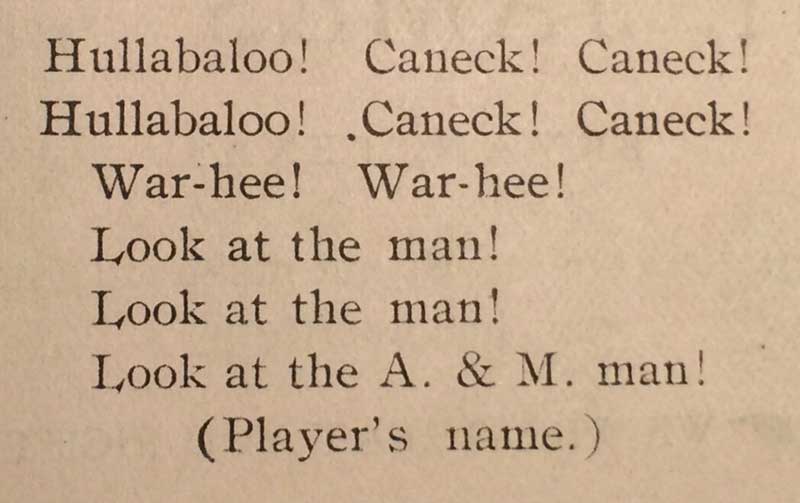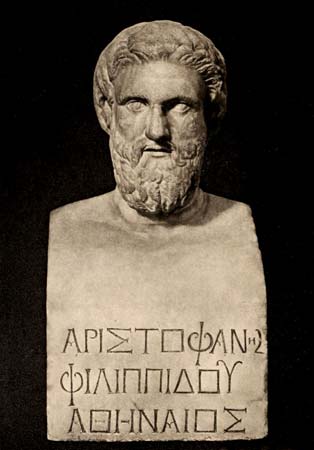Some have said "Hullabaloo, caneck, caneck" is related to the sound of train wheels going over rails or a cannon being loaded.
 Cushing Memorial Library
A&M's archives hold a 1906 "yell book" with these words, more than a decade before the War Hymn was written.
Cushing Memorial Library
A&M's archives hold a 1906 "yell book" with these words, more than a decade before the War Hymn was written.
J.V. "Pinky" Wilson '21 is said to have used it in the "War Hymn" because the thumping sound of World War I artillery reminded him of an older yell (the phrase appears in a 1906 A&M yell book).
Asked by a state legislator in 1972, university president Dr. Jack K. Williams said, "It is Chickasaw Indian for 'Beat the hell out of the University of Texas.'"
There's a chance, however, that it has more to do with frogs.
In the early days of football, America's college students were yelling some mighty silly stuff. Princeton and Yale were among early powerhouses in the late 1800s, and their fans came up with cheers and songs that quickly spread to other schools. The "skyrocket yell," said to be the first collegiate cheer, was adapted by Princeton as early as the 1850s from military usage; its "sis-boom-bah" (representing the sounds of a firecracker soaring and bursting, then the crowd's "ah") was adopted across the country, and A&M still has a version.
Many cheers had words that were seemingly nonsensical, chosen for the noise they could produce.
That's how Yale's "Long Cheer" took shape in 1884, opening with Greek quotations from Aristophanes' play "The Frogs": "Brek-ek-ek-ex, ko-ax, ko-ax! Brek-ek-ek-ex, ko-ax, ko-ax! O-op! O-op! Parabalou! Yale! Yale! Yale! Rah! Rah! Rah! Rah! Rah! Rah! Rah! Rah! Rah! Team! Team! Team!"
According to Yale's alumni magazine, a student reading the play found "a line well suited to 'make a great noise'": "Brek-ek-ek-ex, ko-ax, ko-ax" is the sound the frogs make—basically, Greek for "ribbit."
They added some of the boatman's dialogue ("parabolou" means "heave to"), and after the cheer fueled a Yale baseball rally, it took off.
Eight years later, in an 1892 almanac list of college cheers, you can see Aristophanes making his way across the fruited plain:
- "Bric-a-ty Brax Co-ax Co-ax -- Bric-a-ty Brax Co-ax Co-ax – Hul-la-ba-loo! Hul-la-ba-loo, Woo, 'Rah Ninety-two!" – Dickinson College (Pa.) Class of 1892 cheer
- "Hubla-le-luck, ko-ak—ko-ak; ! Hubla-le-luck, ko-ak—ko-ak; Wo-up, wo-up, Diabolou, Richmond!!" -- Richmond (Va.) College
- "Brekety Kex Ko-ax Ko-oo, Brekety Kex O '92!" – Wabash College (Ind.) Class of 1892 cheer
- "Wich-i-Koáx, Ko-áx, Koáx! "Wich-i-Koáx, Koáx, Koáx! W.J. W.J. Boom!" -- Washington and Jefferson College (Pa.)
And then there's this:
- "Hul-la-ba-loo! Kenick Kenick. Hul-la-ba-loo! Kenick Kenick. Who's Alive, Ninety-five, Tiger!" – Dickinson's Class of 1895 cheer
The 1894 almanac has this from Johns Hopkins University in Maryland:
- "Hullaballoo, Kanuck, Kanuck! Hullaballoo, Kanuck, Kanuck! Hoorah! Hoorah! J. H. U.!"
"Hellaballoo-conneck-conneck" appears closer to home in an 1899 Auburn yearbook; in fact, that yell is almost identical to the 1906 A&M yell pictured above. Auburn kept the phrase around for quite some time; "Hullerbaloo, ker-neck, ker-neck! Hullerbaloo, ker-neck, ker-neck!" also pops up in a 1926 football program.
 Uffizi Gallery, Florence
Lines from Aristophanes' comedy 'The Frogs' found their way into football cheers in several states.
Uffizi Gallery, Florence
Lines from Aristophanes' comedy 'The Frogs' found their way into football cheers in several states.
Even after "Hullabaloo! Caneck! Caneck!" was in print at A&M, the 1912 yearbook shows another variant of Yale's "Long Cheer": "Alla-ca-zoo! Co-ax! Co-ax! Terra-orex-orex-orex! Hulla-baloo! Hulla-baloo! Aggies! Aggies! Rah! Rah! Rah!"
So the concept was definitely making the rounds, like the skyrocket cheer and indeed the entire concepts of organized yelling and male cheerleaders (nationwide, cheerleading began as an all-male endeavor). It's not surprising, though, that it persisted at Texas A&M, where even today, students continue carefully passing down traditions to each other.
"Hullabaloo" is an actual English word that snuck in among the nonsense syllables, possibly because it was more familiar than "parabolou." (It's undeniably hard to get your Greek spelled right when it's being yelled from the opposite bleachers.) Meaning a noisy uproar, "hullabaloo" dates back more than two centuries; the Oxford English Dictionary cites "hollowballoo" in 1762 and "hallaballoo" in 1800.
There's no direct line from "Co-ax! Co-ax!" and "Parabolou!" to "Hullabaloo! Caneck! Caneck!"
But the odds seem fair that Aristophanes had a role.



